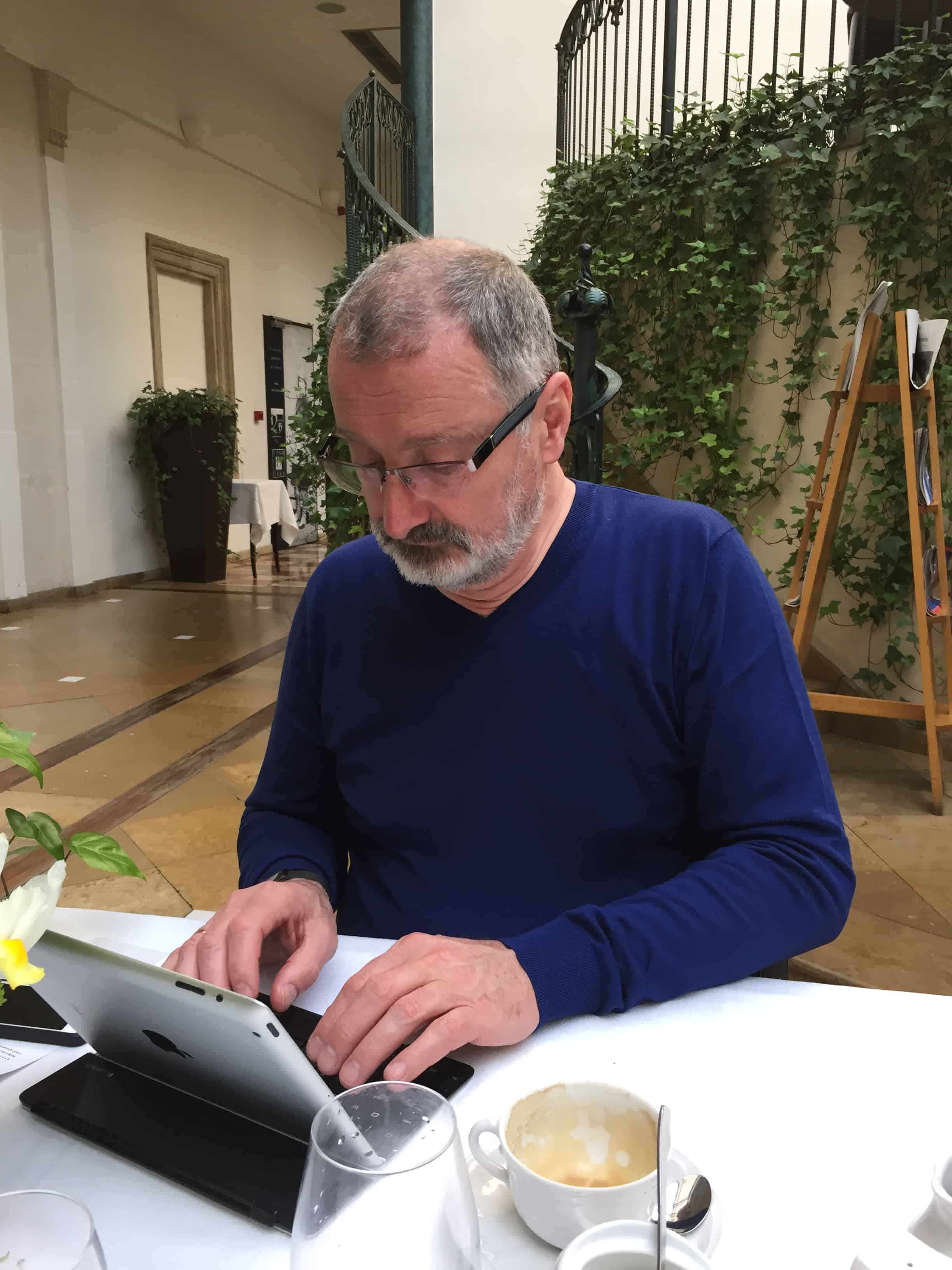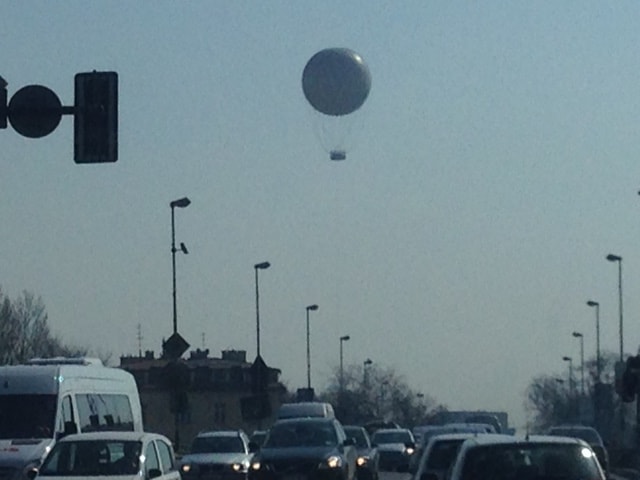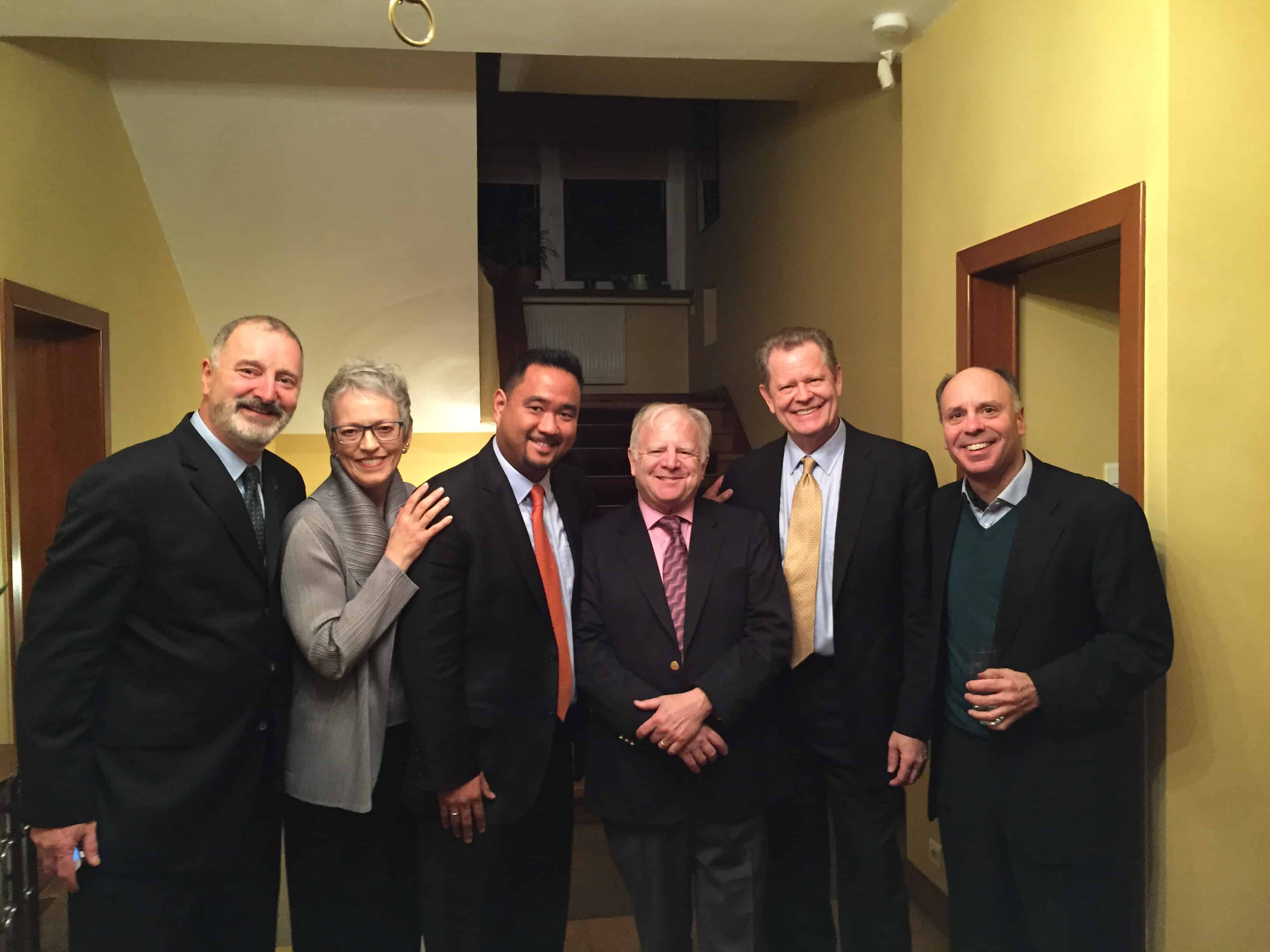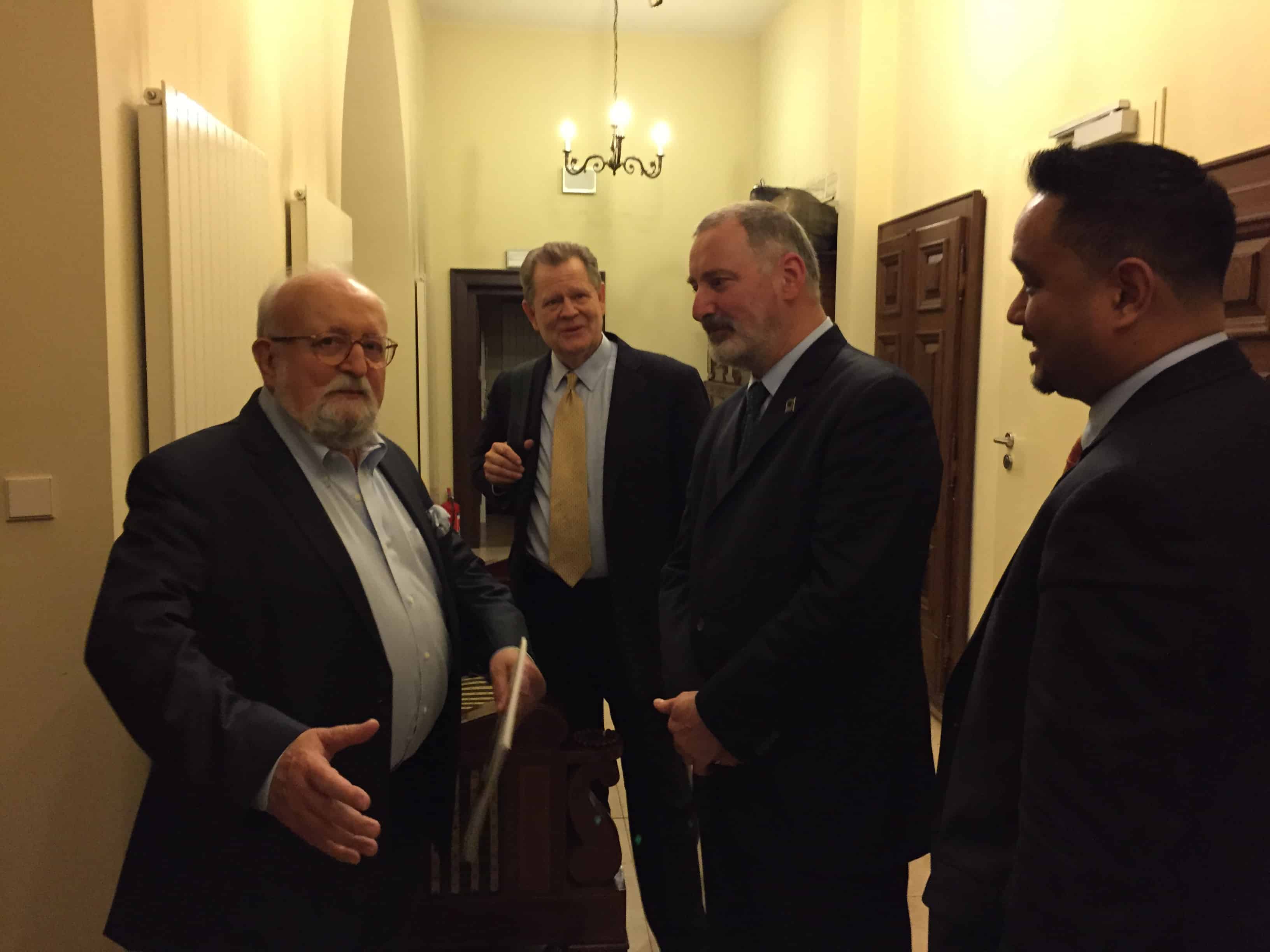
Our arrival in Krakow just after dark on Tuesday evening was spot on time and every bit of baggage arrived with us too — what a relief! Clearing customs without incident, we loaded up a pair of cabs while enjoying the welcome chilly breeze. It was brisk but refreshing with the unmistakable waft of spring in the air. Having spent what amounted to 24 hours hermetically sealed-up while transiting in and between planes and various airport lounges, the relief of fresh open-air was welcome. The twilight on our approach had enabled us just to make out the greening fields and red-roofs of the surrounding arable fields and farmsteads; something of the southern Polish topography that we’ll look forward to enjoying later in our visit when much of our ongoing itinerary within the country will involve travel by car in daylight. Meanwhile however, the short 20 minute taxi-ride into the city yielded some entertaining banter as the various quartet and film-crew members entertained each other, beginning to relax after a long day’s travel. We volunteered a few serious but mostly silly interpretations, on the unfamiliar language on the suburban signage.

The approach to our hotel in the Historic Quarter involved a clockwise circuit around the traces of the old city wall, weaving between trams, busses, cabs and pedestrians, yielding impressive views of the floodlit castle to our left and the various steeples, spectacular gables, towers and landmarks of the old town to our right. We eventually turned off and wended our way in toward the heart of the city on ever-narrowing cobbled streets giving way finally to a pedestrian only precinct and the intersection of our own Pod Roza Hotel on the Florianska street. Our welcoming and attentive logistics personnel from the Beethoven Association stayed with us just long enough to oversee the check-in to our gracious accommodations and we were left to settle in for the night.
A sumptuous breakfast in the hotel’s light-filled winter-garden dining room was the perfect way to start our first full day in Poland and, a FULL day it certainly was. We elected to walk over with our guide to the local music high school, just 6 minutes by foot, for a rehearsal from 12-3. Our concerns were primarily to touch up on the problematic spots in the demanding program for the first evening’s concert and to ensure that we all felt rested, that the instruments (and the musicians) were settled and acclimatized to the new weather, and that there were no nasty surprises. Everything checked out well and with that under our belts, we returned to rest for a while at the hotel and get a bite to eat. We dressed for the concert and headed out again at 5:30 to walk all of 3 minutes in the opposite direction now, to the beautiful Sukiennice which houses the National Museum of Krakow and where we were to play in the spectacular Cloth Hall.

What a venue! The stunning 19th Century canvases of Polish artwork which surrounded performers and audience alike left us speechless. Seeing such an overwhelming array of exquisite work on such a monumental scale, all by artists who’s names remain unknown to most of us was a humbling, almost intimidating experience. We knew we had to give our utmost in this setting but in that, we were met by the most welcoming and distinguished of audiences we might ever wish for. The assembled audience included many celebrated Polish and American dignitaries, renowned academics, musicians, students and musicologists and music lovers. Included in the very front row were US Consul General, Ellen Germain, Krzysztof and Mme Elzbieta Penderecki who is the President of the Beethoven Association, and our presenters, as well as guests, Maestro Leonard and Mrs Slatkin.
It was an illustrious gathering to be sure in a stunning setting and happily, much of the evening was recorded and captured on film. The program was warmly received and we were delighted to offer as an encore, a transcription by Zak Grafilo of the first of Shostakovich’s Preludes and Fugues in C Major. It was a relief to have completed the first program of our tour on the first day of the trip. It was probably the most physically and mentally challenging undertaking of the trip, dealing with travel fatigue while conjuring the extra concentration and focus demanded to deliver the challenging program well.
With just a moment to walk the 3 minutes to our hotel where we secured our instruments, we were driven to the beautiful home of US Consul General, Ellen Germain, who hosted a relaxed and gracious reception in her Krakow home in honor of the ASQ and the Beethoven Association. It was a lovely gathering, providing an opportunity to unwind and visit in the company of many new and even some old friends, while celebrating the wonderful music that brought us all together! The “Sister-City” communities of Krakow and San Francisco seemed particularly well-met in this lovely and convivial setting, reflecting on a great deal in common. Our sincere thanks to Mme. Germain.
Another super breakfast kicked off our 2nd full day. Quartet members and SFState DocFilm Institute colleagues congregated spontaneously, even if it seemed by previous appointment. An important contributing factor to our coordinated orientation must be that we have quickly discovered that Krakow is a city of superb coffee — and pastries — a destination could surely not be outdone by the likes of Vienna or Florence. We all seemed inclined to linger over yet another coffee as we plotted the activities of the day ahead. My own voluntary assignment was to swing through a traditional street market with cameraman Warren Haack. Whenever visiting a new city, country or culture, I tend to search out authentic street life featuring the local residents, check out the less “spectacular” land-mark churches, synagogs, mosques, anything to escape the kind of self-conscious tourist-centric historic city center where our hotel is based. I had scoped it out the day before so we were able to efficiently navigate the scenic five minute walk through the northern ancient city-wall gate, off the Florianska, finding our way into the compound of tented market stalls. Here is where everyday transactions flourish among farmers, merchants and peddlers of all colors dealing in the everyday necessities of Krakow’s city dwellers. The exposure afforded tremendous insights into the local economy, the standard of living and the common values of Poland’s real people — not the movers and shakers but rather the salt of the earth kind of folks who make an honest living, sometimes in the most unsophisticated of ways. As a Brit., born in the mid-20th century and who came of age, studying, living and working in western Europe, I was particularly interested in and affected by my colleague Warren’s reactions to the scene. Warren is close to my age and although very well traveled in the southern hemisphere, this was his first visit to Europe. We found ourselves compelled to take frequent off-camera breaks to debrief each other on our impressions of this lively street scene. Warren’s spot on assessment in my view was that these people are hardworking, live close to the land and within their means, eating wonderfully fine fresh food – (and incidentally, consistently non-GMO).
Returning to the hotel to pickup instruments and colleagues, we made our way to the fine music-centric high school where we had been invited to conduct an open rehearsal in the superb atelier concert hall. We set up on the floor with the audience (rather than elevated and removed on the stage) amongst the assembled students faculty and neighbors who came to watch us rehearse our program for the 2nd evening’s concert. It was a delight, during our frequent breaks to field lots of perceptive questions and comments from fellow musicians young and old, whether experienced or less so, whilst we got on with the essential work at hand, hosted within a generous and enthusiastic cocoon of curious and supportive well-wishers. No time to loose, we headed back once more to the hotel to rest briefly, snack and change for our second evening at the Sukiennice. A very different and somewhat unusual program for Thursday, we featured early and late Beethoven, including the Op. 131 to close the 1st half! It was was a “first” for us to bookend this monumental work and something that in hindsight felt quite surreal. The concert finished with the Brahms C Minor quartet and to close. Spurred on by thunderous and rhythmically unified applause, a hallmark of European audiences, we offered another encore. Tonight, it was Zak’s disarmingly beautiful transcription of Brahms’s beloved Op. 118 # 2 Intermezzo, originally for piano. This evening’s completely chronologically sequential and ultimately very satisfying program came off beautifully although curiously for my colleagues and I, it was an unanticipated surprise to find ourselves mustering strength and focus anew in order to perform another huge and romantic work on the 2nd half. Having successfully recovered from the spending of such emotional effort on the Op. 131, typically the final work on a program, it proved a welcome and insightful learning opportunity, in particular because we will perform in similar sequence next week in Warsaw’s Royal Castle. Now we’ll know what to expect.
Happy and deeply gratified by such an enthusiastic response to the evening’s program, there were still more treats in store as we moved on to an unforgettable post-concert celebratory dinner hosted by Mme. Elzbieta Penderecki, President and General Director of the Beethoven Association and Festival. We gathered at the stunning restaurant of the inimitable Hotel Copernicus, situated on one of Krakow’s oldest and most noble streets in the shadow of the Royal Wawel Castle. We were treated to some of the finest cuisine, spectacular wines and convivial company as we once again gave thanks in the tradition of bringing people of cultures, generations and nationalities together through the universality of great music.
We spent a greatly anticipated and yet still, unimaginably magical Friday morning. We were transfixed, finding ourselves at the Library of the Jagiellonian University where we had been invited to examine several manuscripts as well as sketches of Ludwig van Beethoven’s late quartets. It was stunningly impressive to have these priceless treasures at hand. Some of the works that came to hand included a combination of sketches and/or complete manuscripts of Op. 74, 127, 133, 130. 131. These treasures were presented on a felt covered table in a private showing where we spent every minute of time available to us marveling over the markings, the corrections, notes in margins and a few seemingly undecipherable scribblings. We each had many particular passages and measures that we were hoping in manuscript would reveal decisive answers to the countless hours my colleagues and I have spent in debate (or worse) over more than three decades of digging for resolution. We were so honored and yet bemused to behold these troves. It seems entirely appropriate that not a single tormented argument from these three and a half decades, most of which seem entirely obscure in hindsight were resolved and no one was vindicated. Perhaps we’re just doing what is inevitable as we continue to mine for meaning in Beethoven’s masterworks.

Alas we were torn away to our next appointment which was to play an informal program of music for the students, teachers and parents at the remarkable International School of Krakow. We were hosted at the delightful campus on the outskirts of town playing for students from 1st through 10th grades for an hour. We were delighted to present several selections from Mozart, Beethoven, Brahms and were invited to field some significant and probing questions from students of all grades, as well as several faculty. It was a great pleasure to be welcomed, along with Maestro Krzysztof and Mme Elzbieta Penderecki at this impressive school. Although there are many superb musicians resident in Krakow, many of whom would probably happily to volunteer their services to visit the ISK, exposure to native English speaking musicians is less common and therefore greatly appreciated. We thoroughly enjoyed our visit and signed countless autographs, and consumed lovely home-baked treats in the process!
I’m wrapping up this 2nd installment on our Polish blog at breakfast this morning. This is our last full day in Krakow, City of Kings and Poland’s earliest capital city and we’re preparing our last commitment, a masterclass at Krakow’s Music Academy. We’ll be met and escorted by foot to hear no fewer than seven string quartets performing most of the Op. 18 quartets as well as some Prokofiev and Borodin. Evidently Ludwig v. Beethoven is alive and well in Poland!
